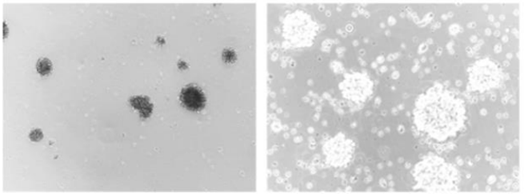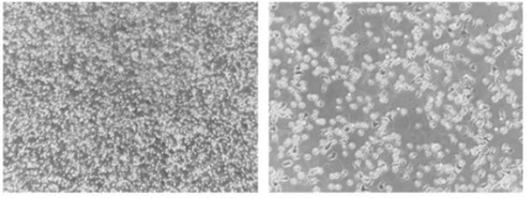- You are here: Home
- Services
- Cell Immortalization
- T Cell Immortalization Service
Services
-
Cell Services
- Cell Line Authentication
- Cell Surface Marker Validation Service
-
Cell Line Testing and Assays
- Toxicology Assay
- Drug-Resistant Cell Models
- Cell Viability Assays
- Cell Proliferation Assays
- Cell Migration Assays
- Soft Agar Colony Formation Assay Service
- SRB Assay
- Cell Apoptosis Assays
- Cell Cycle Assays
- Cell Angiogenesis Assays
- DNA/RNA Extraction
- Custom Cell & Tissue Lysate Service
- Cellular Phosphorylation Assays
- Stability Testing
- Sterility Testing
- Endotoxin Detection and Removal
- Phagocytosis Assays
- Cell-Based Screening and Profiling Services
- 3D-Based Services
- Custom Cell Services
- Cell-based LNP Evaluation
-
Stem Cell Research
- iPSC Generation
- iPSC Characterization
-
iPSC Differentiation
- Neural Stem Cells Differentiation Service from iPSC
- Astrocyte Differentiation Service from iPSC
- Retinal Pigment Epithelium (RPE) Differentiation Service from iPSC
- Cardiomyocyte Differentiation Service from iPSC
- T Cell, NK Cell Differentiation Service from iPSC
- Hepatocyte Differentiation Service from iPSC
- Beta Cell Differentiation Service from iPSC
- Brain Organoid Differentiation Service from iPSC
- Cardiac Organoid Differentiation Service from iPSC
- Kidney Organoid Differentiation Service from iPSC
- GABAnergic Neuron Differentiation Service from iPSC
- Undifferentiated iPSC Detection
- iPSC Gene Editing
- iPSC Expanding Service
- MSC Services
- Stem Cell Assay Development and Screening
- Cell Immortalization
-
ISH/FISH Services
- In Situ Hybridization (ISH) & RNAscope Service
- Fluorescent In Situ Hybridization
- FISH Probe Design, Synthesis and Testing Service
-
FISH Applications
- Multicolor FISH (M-FISH) Analysis
- Chromosome Analysis of ES and iPS Cells
- RNA FISH in Plant Service
- Mouse Model and PDX Analysis (FISH)
- Cell Transplantation Analysis (FISH)
- In Situ Detection of CAR-T Cells & Oncolytic Viruses
- CAR-T/CAR-NK Target Assessment Service (ISH)
- ImmunoFISH Analysis (FISH+IHC)
- Splice Variant Analysis (FISH)
- Telomere Length Analysis (Q-FISH)
- Telomere Length Analysis (qPCR assay)
- FISH Analysis of Microorganisms
- Neoplasms FISH Analysis
- CARD-FISH for Environmental Microorganisms (FISH)
- FISH Quality Control Services
- QuantiGene Plex Assay
- Circulating Tumor Cell (CTC) FISH
- mtRNA Analysis (FISH)
- In Situ Detection of Chemokines/Cytokines
- In Situ Detection of Virus
- Transgene Mapping (FISH)
- Transgene Mapping (Locus Amplification & Sequencing)
- Stable Cell Line Genetic Stability Testing
- Genetic Stability Testing (Locus Amplification & Sequencing + ddPCR)
- Clonality Analysis Service (FISH)
- Karyotyping (G-banded) Service
- Animal Chromosome Analysis (G-banded) Service
- I-FISH Service
- AAV Biodistribution Analysis (RNA ISH)
- Molecular Karyotyping (aCGH)
- Droplet Digital PCR (ddPCR) Service
- Digital ISH Image Quantification and Statistical Analysis
- SCE (Sister Chromatid Exchange) Analysis
- Biosample Services
- Histology Services
- Exosome Research Services
- In Vitro DMPK Services
-
In Vivo DMPK Services
- Pharmacokinetic and Toxicokinetic
- PK/PD Biomarker Analysis
- Bioavailability and Bioequivalence
- Bioanalytical Package
- Metabolite Profiling and Identification
- In Vivo Toxicity Study
- Mass Balance, Excretion and Expired Air Collection
- Administration Routes and Biofluid Sampling
- Quantitative Tissue Distribution
- Target Tissue Exposure
- In Vivo Blood-Brain-Barrier Assay
- Drug Toxicity Services
T Cell Immortalization Service
Antigen-specific T cells play an important role in cellular immune response against cancer. The ability to isolate, maintain, and characterize tumor-specific T cells is a prerequisite to studying anticancer immune response and developing novel strategies for cancer immunotherapy. And T cells can also be used to screen potential drug candidates for their effects on T cell function and viability.
However, the life span of human T cells in vitro is usually very short and is limited by the onset of cellular senescence. To establish long-term, antigen-specific T-cells lines and clones, Creative Bioarray offers T cell immortalization service for you. In 2023, we established Immortalized Human T Cells using Epigenetic Approach successfully. Immortalized human T cells from Creative Bioarray can be cultured continuously for 20 passages. In addition, we also have other T cell immortalization methods available for you.
Methods for Establishing Immortalized T Cells
- Epigenetic Induction of Cell Growth
The Epigenetic Induction of Cells Growth (No viral gene) is a great method to establish the immortalized cell lines. Immortalized Human T Cells were successfully developed utilizing the epigenetic approach. The immortalized human T cells from Creative Bioarray can be consistently cultured for up to 20 passages. We are confident in using this method for T cell immortalization.
 Figure 1. Human T cell immortalization by Epigenetic Induction of Cell Growth. Growing T cells at Day 2 after stimulation. NOTE: Non-fused control T cells can be cultured in the same conditions for 2 weeks before showing deteriorating cell growth.
Figure 1. Human T cell immortalization by Epigenetic Induction of Cell Growth. Growing T cells at Day 2 after stimulation. NOTE: Non-fused control T cells can be cultured in the same conditions for 2 weeks before showing deteriorating cell growth.
 Figure 2. Human T cell immortalization by Epigenetic Induction of Cell Growth. Growing T cells at Week 3 after stimulation.
Figure 2. Human T cell immortalization by Epigenetic Induction of Cell Growth. Growing T cells at Week 3 after stimulation.
- Overexpression of hTERT Gene
Some published literature indicates that hTERT gene transfection can immortalize human T cells. PBMCs were stimulated with antigens, and then infected with a murine leukemia virus-based retroviral vector carrying an immortalizing gene, the human telomerase-reverse transcriptase (hTERT) gene. Since such vectors can only integrate in dividing cells, only antigen-activated T cells are efficiently transduced. Using this approach, the immortalized T cell lines that maintained strictly IL-2-dependent growth and MHC-restricted, antigen-specific responsiveness, some of which have been in continuous culture for longer than 1 year, far in excess of the survival of parallel control no immortalized cultures. If you are interested in using this method, Creative Bioarray would be willing to try it for you.
- Overexpression of Oncogenes
Some scientists have established Immortalize human T cells using overexpression of c-Ha-ras and c-myc oncogenes. The cell lines kept growing for 3 months after establishment without a decrease in growth rate. The cells did not require interleukin-2(IL-2) for their growth, but addition of IL-2 stimulated the growth of these cells. Flow cytometric analysis revealed that these cells were T cells expressing CD4 or CD8 antigens. If you are interested in employing this approach, Creative Bioarray would be willing to provide the service for you.
Applications of Immortalized T Cells
- Studying T cell biology and function: Immortalized T cell lines can be used to investigate various aspects of T cell biology, such as activation, differentiation, and signaling pathways.
- Drug screening and development: Immortalized T cell lines can be used to screen potential drug candidates for their effects on T cell function and viability.
- Vaccine development: Immortalized T cell lines can be used to study immune responses to vaccines and to evaluate vaccine efficacy.
- Immunotherapy research: Immortalized T cell lines can be used to investigate novel immunotherapies, such as chimeric antigen receptor (CAR) T cell therapy.
- Infectious disease research: Immortalized T cell lines can be infected with pathogens to study host-pathogen interactions and immune responses to infection.
Creative Bioarray's T Cell Immortalization Service has the following Features:
- Immortalized cell lines from any species
- Different methods of cell immortalization you can choose
- Characterization according to your requirements
- Projects are designed and handled by experienced scientists.
- Short turn-around time
- Competitive pricing
Quotation and ordering
Our customer service representatives are available 24hr a day! We thank you for considering Creative Bioarray as your T Cell Immortalization Service partner.
Explore Other Options
For research use only. Not for any other purpose.

